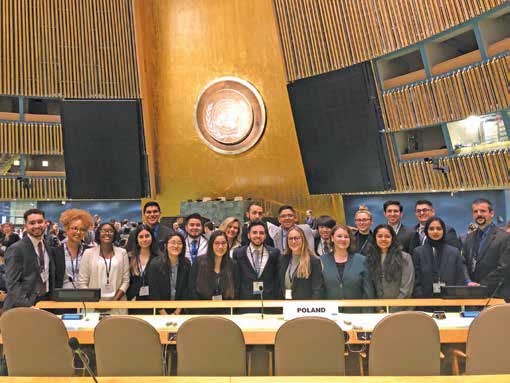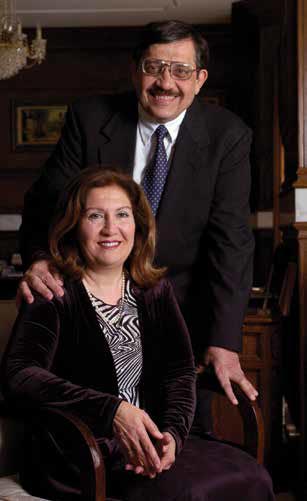Model Students
Alumni Reach a Consensus: UN Program Spurs Success and Civility
By Paul Sterman
Farrah Hassen (’04, political science) learned the delicate art of diplomacy at Cal Poly Pomona. As an undergraduate student, she spent three years on the university’s Model United Nations team, which puts a premium on respecting differing viewpoints.
Hassen was particularly grateful for that training when she later became a political advisor to the Syrian ambassador to the United States. She served in the role during the Arab Spring, when pro-democracy uprisings convulsed the Middle East in 2011. Based at the Syrian Embassy in Washington, D.C., Hassen participated in many difficult discussions with Syrian colleagues, whose perspective on the crisis depended largely on what religious and ethnic sect they belonged to.
“Just on the most basic level — colleague to colleague — I really had to be especially respectful and understanding and non-judgmental, even if I disagreed with their opinions,” she says.
Hassen is one of many Cal Poly Pomona alumni who say they have benefited greatly from their Model U.N. experience. Past participants include Jonathan Farrar (’78, political science), the former U.S. ambassador to Panama.
 Every year, Cal Poly Pomona sends a delegation of about 15 to 20 students (representing a variety of campus majors) to the National Model United Nations conference in New York. The five-day event draws thousands of students from universities in the United States and other countries. Each team represents a different country, and students immerse themselves in complex global issues as they experience diplomacy firsthand.
Every year, Cal Poly Pomona sends a delegation of about 15 to 20 students (representing a variety of campus majors) to the National Model United Nations conference in New York. The five-day event draws thousands of students from universities in the United States and other countries. Each team represents a different country, and students immerse themselves in complex global issues as they experience diplomacy firsthand.
During Hassen’s three years on the team, Cal Poly Pomona represented Costa Rica, Tunisia and Belize, respectively, and she was chosen as head delegate of the Tunisia and Belize squads.
The conference activities are designed to reflect what global leaders do in the real world. Employing proper decorum and diplomatic verbiage, students caucus, negotiate, deliver well-researched arguments and work to pass legislation. The student groups vie for awards such as “Outstanding Delegation” and “Outstanding Position Paper.”
“I really like how collaborative Model U.N. is,” says alumna Tara Kwan (’17, political science), a three-year member of teams representing Spain, Mexico and Slovenia. “It’s all about working together to find a solution to global problems. I feel like that’s something we could all work on, especially in today’s political climate.”
A head delegate in her senior year, Kwan says participating in Model U.N. gave her the confidence to take on leadership roles. She now works in the Los Angeles Mayor’s Office of Immigrant Affairs, and her boss is alumna Linda Lopez (’92, political science), who also participated in Model U.N.
Cal Poly Pomona’s teams have been highly successful, consistently taking home top prizes from the annual conference. The program also benefits from the generosity of Farrah Hassen’s father, Khaled Hassen (’68, civil engineering). In 2004 he established the Hassen Family Endowment to provide long-term funding for the program.
He says he was inspired to act after seeing how positive Farrah’s experience was.
“I saw the joy in her face and watched her grow in confidence as a young woman determined to make a difference in the world,” says Khaled, who emigrated from Syria to the United States in 1962 and later became a U.S. citizen.
He says he recently made another contribution to the endowment after seeing University President Soraya M. Coley’s “continued support and enthusiasm” for the campus program.
Much of its success is credited to history Professor Emeritus John Moore, the team’s faculty advisor for more than 30 years. Moore says it was rewarding to see how students grew from their Model U.N. participation, recalling how they would return from the New York trip “changed people every time — not only changed but more mature, more interesting.”
Members of the CPP team take a class to prepare them for the spring conference. They research everything about their assigned country, pair up
to write policy papers and form into delegation committees. In New York, most of the activities are held at a hotel, but typically the conference culminates with a session at the U.N. headquarters. Students gather in the building’s historic General Assembly Hall.
“I think all students would say the greatest part of the trip is going to the actual U.N.,” says Farrah Hassen, whose sister Susan (’08, communication) was also on the Model U.N. team.
Political science Professor Marc Scarcelli, the team’s current advisor, says students learn crucial skills that translate to any career path: research and analysis, writing succinctly, thinking on your feet, public speaking and cooperating with others.
And when it comes to multicultural education, he says, “you couldn’t ask for a better example than this program.”
Farrah Hassen is Making a Career in International Relations
Farrah Hassen has accomplished a lot in her life, but she is quick to credit others for their role in her success. And that starts with two key mentors at Cal Poly Pomona.
The first was John Moore, the Model U.N. team’s faculty advisor for many years. Not only did he help students improve their writing and increase their awareness of current events, she says, but “Dr. Moore inspired us, especially me, to challenge sobering narratives on power, war, and inequality by committing to build a better world through international diplomacy, intellectualism and social justice.”
Moore actually introduced Hassen to her second mentor: Cal Poly Pomona professor and award-winning journalist Saul Landau, who taught in the history department and served as chair of digital and media studies. In her sophomore year, she became his research assistant and the next year worked with him to make the 2004 documentary “Syria: Between Iraq and a Hard Place.”
Hassen, credited as the film’s associate producer, and Landau — who died in 2013 — shot the film in Syria, marking the first time she visited the country where her father was born.
“It was deeply moving,” she says, “because I had a job behind the camera to make this film and show Americans an accurate, truthful portrayal of Syria. But I was also learning about where my dad went to school and where my mom grew up, so it was also meaningful in that way.”
An expert in U.S.-Syria relations, Hassen’s articles have appeared in such publications as the Chicago Tribune, the Asia Times and Foreign Policy in Focus. (She’s also a musical theater buff who once worked as an executive assistant to famed singer Harry Belafonte.)
Hassen has a master’s degree in international politics and a law degree. She currently works as a consultant on U.S.-Syria issues, advocates on behalf of immigrants and is exploring teaching opportunities.
Cal Poly Pomona Pride Runs Deep in Hassen Family
 To say that Khaled Hassen (’68, civil engineering) has a strong connection to Cal Poly Pomona would be an understatement. He and his wife, Nadia (’76, microbiology), are both graduates — as are their seven children. As are his brothers and some of their children. And their extended family members, including sisters and brothers-in-law from Nadia’s side of the family.
To say that Khaled Hassen (’68, civil engineering) has a strong connection to Cal Poly Pomona would be an understatement. He and his wife, Nadia (’76, microbiology), are both graduates — as are their seven children. As are his brothers and some of their children. And their extended family members, including sisters and brothers-in-law from Nadia’s side of the family.
In all, more than 35 members of the Hassen family have graduated from Cal Poly Pomona.
Besides providing funding for the university’s Model U.N. program, Khaled has donated to the President’s Scholars program and served as a founding board member of the University Educational Trust, a philanthropic auxiliary that raised millions of dollars for CPP scholarships.
“Because Cal Poly Pomona is so special to me and my family, I have always felt a responsibility to give back as an alum,” he says.
Recalling how he came to California speaking very little English and possessing very little money, Hassen says his education, hard work and persistence enabled him to achieve success. He was the longtime president of Hassen & Associates, a firm engaged in real estate development and international business investment, development and marketing.
“I want all students, including immigrants who identify with my story, to take pride in their roots, take advantage of all the programs and opportunities Cal Poly Pomona has to offer, and be empowered to support and inspire the next generation of Cal Poly Pomona students.”
